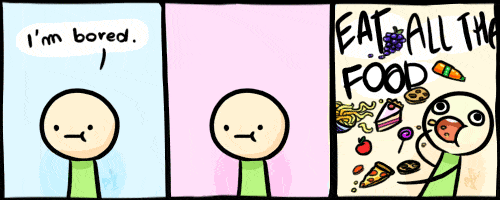“Associations Between Adult Attachment Style, Emotion Regulation, and Preschool Children’s Food Consumption” is the title of a study published by the journal of Developmental & Behavioral Pediatrics, which attempts to better understand the roots of childhood obesity. The questions that drove the researchers’ curiosity are explained by Prof. Kelly Bost:
We wanted to discover the steps that connect attachment and obesity. Scientists know that a person’s attachment style is consistently related to the way he responds to negative emotions, and we thought that response might be related to three practices that we know are related to obesity: emotion-related feeding styles, including feeding to comfort or soothe; mealtime routine; and television viewing.
Routine is another word word for habit, which Childhood Obesity News recently discussed as one of the pillars on which the house of sustained weight loss is built. Because humans revert to habit in times of stress, the importance of establishing useful habits in small children is paramount.
In the matter of feeding styles, “secure attachment” is similar to “unconditional positive regard,” in that both phrases are science-speak for a word that seemingly is unsuitable for scientific papers: love. Here, secure attachment is defined by the availability and responsiveness of the caregiver(s). In other words, someone is with the child, and not just physically present but emotionally available enough to interact.
Responsiveness is a double-edged sword. It is a psychological truism that a child finds even negativity, criticism, and punishment preferable to being ignored. As millions of tragic case histories throughout the ages can attest, painful attention is better than no attention at all.
If the primary care physician were free to explore that path, strewn with emotional landmines, many children who are now obese might not have been. How many families are likely to have the opportunity of full-blown therapy for all members? Or the willingness to undertake it? But those are questions for another day.
Insecure attachment
This University of Illinois study broke some new ground by showing a multi-generational dynamic that had not previously been defined. We take the liberty of personalizing the premise by inventing a fictitious character, Norma. In childhood, the emotional base that supported her was shaky. Her hard-working parents were rarely seen, and she was raised by a series of baby-sitters, au pairs, and nannies. Consequently, Norma was always anxious and uncertain in close relationships.
Norma grows up, has a child, Sandy, and instantly begins a career of ineffective parenting. One day, Norma hears about an academic study, and volunteers to answer questions about how she deals with Sandy’s negative emotions. The researchers want to know if she and the other participants use “emotion-related, pressuring feeding styles known to predict obesity.”
Norma answers all the questions honestly. She cops to using food treats to reward or bribe Sandy, and quite a few other counterproductive activities. Like many other parents in her situation, she becomes overwhelmed by stress and takes the easy way out. The very idea of trying to enforce a set mealtime is exhausting. If Sandy doesn’t want to eat at regular times, fine. Meanwhile, Sandy is the biggest kid in the class.
One thing that parents do is to punish or dismiss the sad or angry feelings of a child, which only leads to more sad and angry feelings, and eventually, to some kind of crisis. This is Prof. Bost again:
The study found that insecure parents were significantly more likely to respond to their children’s distress by becoming distressed themselves or dismissing their child’s emotion…
Clinicians can help address children’s obesity by giving parents practical strategies to help kids deal with negative emotions like anger, sadness, and boredom. That means helping them describe what they’re feeling and working on problem-solving strategies with them.
The researchers’ ultimate question is, will Norma’s relationship with her own mother increase Sandy’s chance of obesity? Sadly, it looks like the answer is yes.
Your responses and feedback are welcome!
Source: “Could your relationship with your mom increase your child’s chances of obesity?,” EurekAlert.org, 01/30/14
Image by Internet meme


 FAQs and Media Requests:
FAQs and Media Requests: 











